Table of Contents
Skills for Bioinformatics Career 2025
From decoding the human genome to powering AI models that detect cancer in histopathology images, bioinformaticians are at the forefront of scientific innovation. In 2025, bioinformatics is not just a career path, but it’s a gateway to transforming healthcare, agriculture, and environmental science using data-driven discoveries. For instance, companies like Illumina and Genentech use genomics to personalize cancer therapies, while organizations like the Broad Institute deploy machine learning to predict the spread of infectious diseases. As biology increasingly digitizes, professionals who can blend life sciences with data science are in high demand. The modern bioinformatician must wear many hats. In this article, we’ll explore the ten essential skills you need to thrive in this evolving and impactful field.
1. Strong Knowledge of Biology and Genomics
To achieve a successful career in Bioinformatics, you must have a strong knowledge of biology, genomics, and bioinformatics tools and software. You should understand how genetic information is stored, replicated, and used for protein production. This includes the organization and regulation of genes, and how they interact with other elements inside the genome.
Small changes in genetic information, like incorrect incorporation of nucleotides or deletions, lead to mutations, which may cause diseases or genetic variations among species.
Hands-on experience with tools such as CRISPR, NGS, gene expression analysis, transcriptomics, and proteomics is critical. Practical training in these tools enhances job readiness for roles in top companies.
Importance:
In recent years, genomics has become a significant part of healthcare and research. Doctors and scientists use genomic data to:
- Discover new drug targets
- Understand genetic diseases
- Create personalized treatments
Platforms to Build This Skill:
- Online courses in molecular biology, genetics, and genomics
- Reading scientific papers and updates from NCBI, Nature Genetics, or GenomeWeb
- Practicing with real-world datasets available on Ensembl and NCBI
✅ Looking to gain real-world experience? Enroll in the Bioinformatics Hands-on Training & Internship Program that includes intensive project work, a 3 to 6-month optional dissertation extension, a work experience letter, and support for publishing your research paper.
2. Programming Skills
In bioinformatics, programming is a core competency. If you want a successful career in bioinformatics in 2025, you must know how to write code to analyze and process biological data efficiently.
Importance: Due to the vast and complex nature of biological data, automation is critical. Bioinformaticians often write scripts to assist in rapid, accurate analysis.
Popular Programming Languages in Bioinformatics:
- Python: Simple, readable, and rich in bioinformatics libraries like Biopython and scikit-bio.
- R: Widely used for statistical analysis and visualization in genomic and transcriptomic studies; packages like Bioconductor are essential.
- Perl: Though older, it’s still used for parsing and data manipulation in legacy systems.
- Bash/Shell scripting: Automates workflows and handles large datasets on HPC clusters.
- Java and C++: Used for high-performance bioinformatics applications.
3. Knowledge of Statistics and Data Analysis
Statistics and mathematics are foundational to bioinformatics. They help analyze and interpret large, complex biological datasets.
Core Concepts:
- Probability, hypothesis testing
- Regression analysis
- Machine learning algorithms
Importance:
- Compare gene expression levels between different conditions
- Determine statistical significance
- Identify whether a mutation is rare or common
Statistical software like R, SPSS, and even Excel (for early learners) can be used for data interpretation and visualization.
4. Machine Learning and AI in Bioinformatics
In 2025, AI and machine learning are widely used to handle massive biological datasets. These technologies help uncover patterns that traditional methods may miss.
Applications Include:
- Predicting protein structure and function
- Classifying diseases using genomic data
- Analyzing histopathology images to detect cancer
- Modeling biological networks and interactions
Tools like scikit-learn, TensorFlow, and PyTorch are becoming standard in bioinformatics workflows.
5. Bioinformatics Tools and Databases
Skills for Bioinformatics Career 2025. Hands-on experience with tools and biological databases is critical.
Importance: Modern biology generates vast datasets, and you must know how to:
- Search biological databases
- Run data analysis pipelines
- Visualize genomic results
- Integrate multi-omic data
Key Tools:
- BLAST
- Bowtie/BWA
- GATK
- FASTQC
- UCSC Genome Browser
- STRING, KEGG
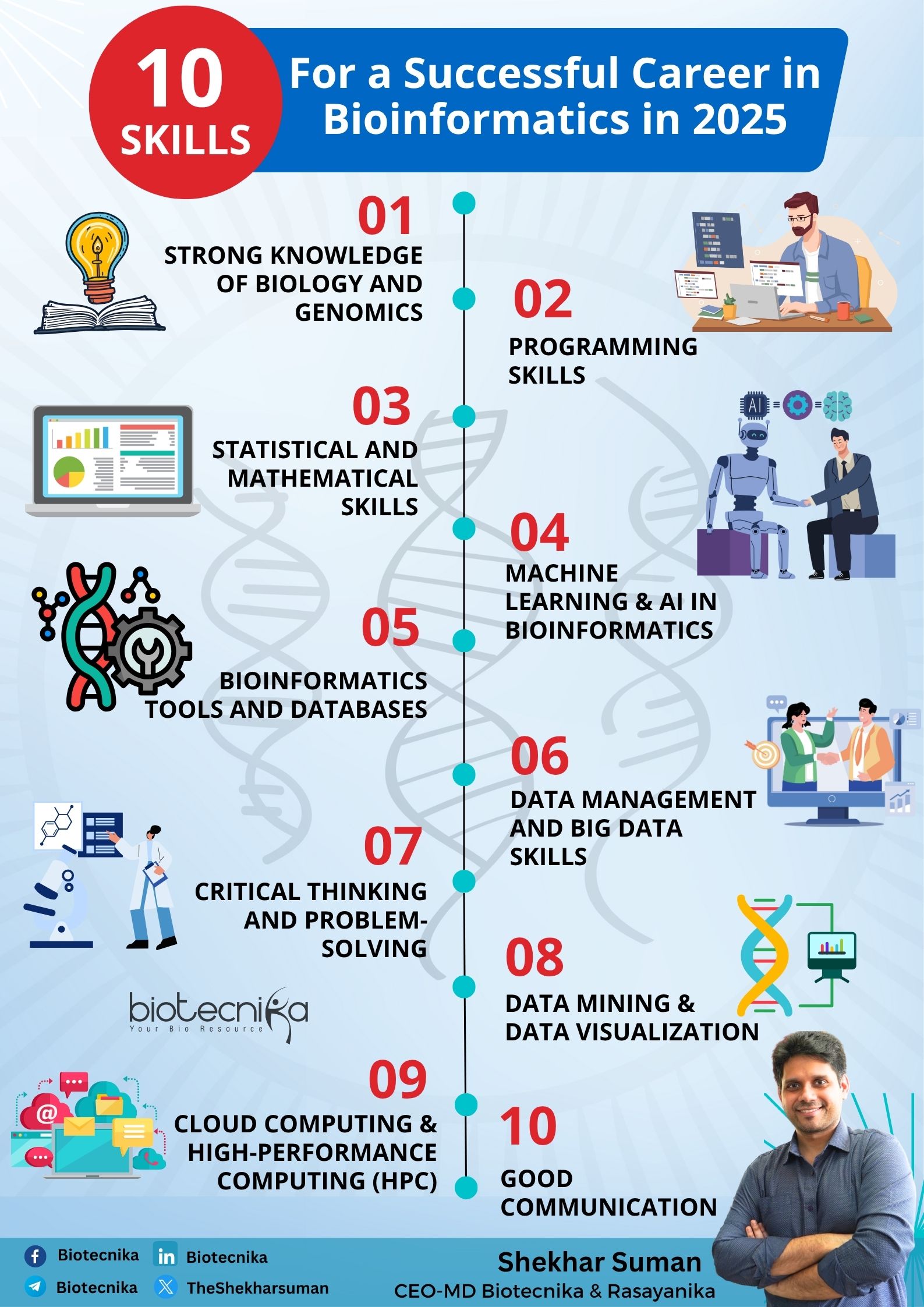
6. Data Management and Big Data Skills
Bioinformatics deals with terabytes of data. You must know how to store, manage, and organize it.
Key Concepts:
- Data Formats: FASTA, FASTQ, BAM, VCF, GTF
- Metadata Management: Helps ensure accurate interpretation of experimental results
- File Organization: Logical structure for future usability
- Version Control (e.g., Git): Tracks changes and promotes reproducibility
These skills are essential for managing patient records, multi-omic datasets, and more.
7. Critical Thinking and Problem-Solving
Beyond technical skills, bioinformaticians must be excellent problem-solvers.
Benefits:
- Identify and resolve errors in pipelines
- Choose optimal tools and methods
- Avoid false conclusions from noisy data
Real-World Scenarios:
- Fixing sequencing workflow errors
- Comparing inconsistent gene expression data
- Integrating clinical and genomic data
8. Data Mining & Visualization in Bioinformatics
These skills are essential for making complex data understandable.
Data Mining Applications:
- Biomarker discovery
- Personalized medicine
- Predicting drug response
Visualization Tools:
- R (ggplot2)
- Python (matplotlib, seaborn)
- Cytoscape
- Plotly
- Tableau (for clinical data presentation)
Visualization bridges the gap between raw data and actionable insights.
9. Cloud Computing and HPC
With data growing rapidly, cloud and HPC skills are vital.
Cloud Computing:
- Platforms: AWS, GCP, Azure
- Enables real-time, scalable data analysis
- Used in clinical labs and startups alike
HPC:
- Required for tasks like genome assembly, molecular modeling
- Tools: SLURM, PBS, parallel computing libraries
10. Strong Communication Skills
Bioinformaticians must often explain complex ideas to non-experts.
Why It Matters:
- Collaborate effectively with biologists, clinicians, and data scientists
- Translate findings into reports, research papers, and grant proposals
- Present data using charts, graphs, and clear summaries in meetings or publications
Soft skills like collaboration, adaptability, and clarity are vital.
Final Thoughts

Bioinformatics is not just growing—it is transforming biology. Whether decoding the human genome, contributing to AI-driven precision medicine, or analyzing massive protein datasets, bioinformatics professionals are writing the future of science.
Imagine this:
- Using genomics to detect rare diseases before symptoms appear.
- Developing AI models to personalize cancer treatments.
- Supporting pandemic response by tracking viral mutations in real time.
So take the leap: learn to code, analyze biological data, sharpen your communication, and make your mark in science.
Ready to kickstart your career in bioinformatics? Join Biotecnika’s Bioinformatics Global Research Tools & Techniques Internship—complete with project work, 3–6 month dissertation options, paper publication assistance, and a work experience certificate.
Skills for Bioinformatics Career 2025


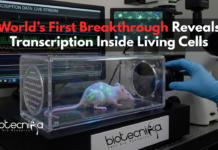
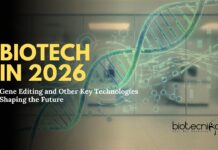

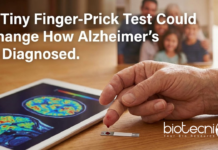















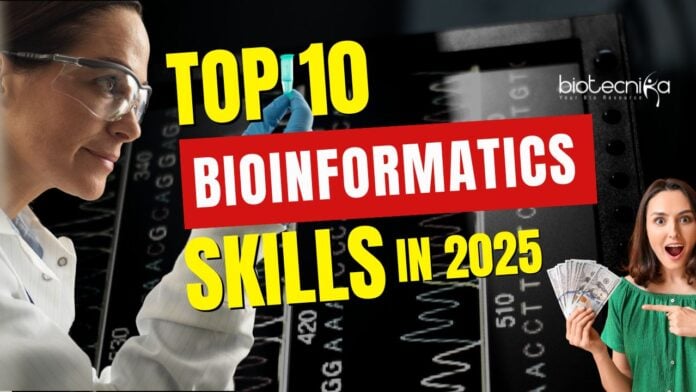







Can I know about the fee details of the 30 days training, is it online